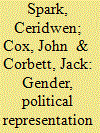| Srl | Item |
| 1 |
ID:
167048


|
|
|
|
|
| Summary/Abstract |
Increasing women’s representation in national legislatures has become a priority for international organisations and aid donors in recent decades. Existing studies emphasise structural barriers, whether economic, cultural or religious, that inhibit women’s participation in the public sphere. Little attention is paid to women who defy these barriers to win election in contexts that are hostile to their presence. This article addresses this gap. Using a Bourdieusian approach, it shows how three senior women leaders from the Pacific Islands translate symbolic capital into political capital. For donors and would-be reformers, the lesson is that institutional interventions must be implemented in ways which allow women’s symbolic capital to be deployed as political capital, or which enhance women’s control of various forms of capital. This message is particularly relevant for those interested in the capacity of quotas and other temporary measures to translate descriptive representation into substantive developmental gains.
|
|
|
|
|
|
|
|
|
|
|
|
|
|
|
|
| 2 |
ID:
174843


|
|
|
|
|
| Summary/Abstract |
This article examines the lives of Port Moresby women who work in the development sector of Papua New Guinea. In particular, it demonstrates how development discourse structures the very fabric of working relationships within this sector in Port Moresby. Underpinned by neocolonial geographies in which those in the global north rescue those in the global south, these discourses produce workplaces in which Papua New Guinean women are seen as lacking the moral and technical capacities to run development projects in their own country. The article argues that the privileges held by expatriates and denied to local women, in conjunction with the workplace discrimination to which they are subjected, ironically undermine the development sector's supposed commitment to promoting gender equality in Papua New Guinea.
|
|
|
|
|
|
|
|
|
|
|
|
|
|
|
|